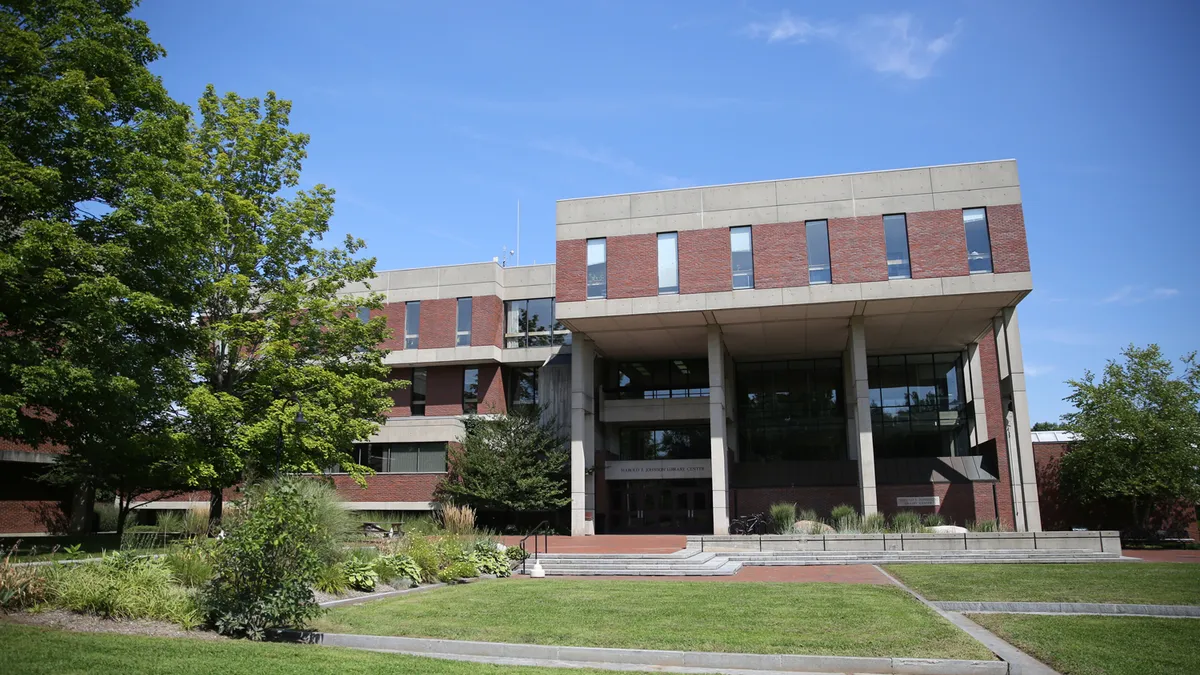Dive Brief:
- Independent and offbeat Hampshire College, struggling like many small private institutions, has taken another few steps in a new direction with plans for a major fundraising campaign and a leadership change after its president and board chair resigned, MassLive reported.
- Miriam Nelson, who was president for less than a year, stepped down on Friday. She had met stiff resistance for her suggestion in January that the college find a partner to help with its financial woes and that it might not admit new students without a solution. The vice chairman and another board of trustees member also resigned in recent weeks.
- The college brought back one of is founders, Kenneth Rosenthal, as interim president. Trustee Luis Hernandez, who was also one of the college's first students, was appointed to lead the board, which voted to keep the college independent and double down on fundraising.
Dive Insight:
While Hampshire's project-based, self-directed learning model is novel, its struggles are not, particularly among small New England institutions, several of which have closed or faced financial difficulties resulting from shrinking enrollment and inadequate endowments. Small colleges across the country have floundered under that weight, and a recent report from credit ratings firm S&P Global suggests that trend will continue, with more closures and other consolidation likely.
The challenge for Hampshire stems in part from its age. Hampshire's $52 million endowment pales in comparison to that of some of its peers, according to Ellen Fitzpatrick, a University of New Hampshire history professor who graduated in the college’s first class and recently documented its history and struggles in The Atlantic. She notes Amherst College's $2.2 billion coffers. Its alumni, which begin with Fitzpatrick and her peers in the 1970 entering class, are "now aging, alas, but not fast enough to provide the kind of bequests that have so enriched its neighboring private liberal-arts schools," which date to the 19th century, she writes. The college uses tuition and fees to pay for 87% of its operating expenses, the Daily Hampshire Gazette reported.
In her January announcement, Nelson said she recognized soon after taking office that the college faced "bruising financial and demographic realities" and that it would need a partner to survive. She went on to cut staff and limit enrollment, but a contingent on the campus rejected her approach and believed the college could move forward with increased fundraising.
Some of those voices are represented in the group Re-Envisioning Hampshire, which calls itself "a broad coalition of ... faculty, staff, students, alums, and parents with a plan to keep Hampshire College independent." The group announced on Twitter that it had raised more than $3 million as of March 26 toward a short-term $5 million fundraising goal and a longer-term $20 million raise.
In a letter to the campus community on Friday, Hernandez promised "more news to come" on a fundraising initiative by the college.
Fundraising has been a solution for some small private institutions, most notably St. John's College, which announced last year that to stay solvent it would nearly halve its tuition price and offset the change by raising $300 million. The effort is reportedly off to good start, with the Maryland college saying it is more than halfway to its goal.
Both Sweet Briar College, in Virginia, and Bennett College, in North Carolina, have responded to serious financial struggles with large fundraising campaigns — though as Bennett's case indicates, fundraising isn't always a guarantee for struggling colleges.










